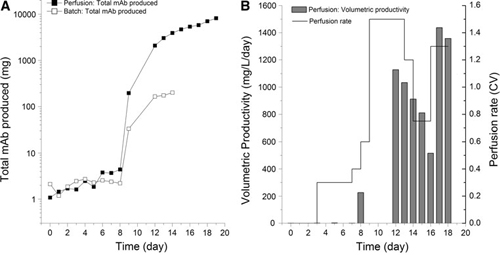On December 25, 2011, Molecular Biotechnology published online a research article entitled “High Yield of Human Monoclonal Antibody Produced by Stably Transfected Drosophila Schneider 2 Cells in Perfusion Culture Using Wave Bioreactor” by Paul Zhou’s laboratory at the Institut Pasteur of shanghai, Chinese Academy of Sciences. This is the first report on using Wave bioreactor to produce human monoclonal antibody by stably transfected Drosophila S2 cells.
Therapeutic human monoclonal antibody has grown into multi-billion industry. A further increase in demand is expected. Thus developing reliable culture conditions for the large scale human monoclonal antibody production are practically important. Since it was introduced in late 1990s Wave bioreactor has been used for protein production by mammalian and insect cells. However, using Wave bioreactor to produce human monoclonal antibody by stable Drosophila Schneider 2 (S2) cell transfectants has not been reported before.
In this study, research associate Lulan Wang and Ph.D. student Hongxing Hu in Professor Paul Zhou’s laboratory so-transfected S2 cells with an inducible vector expressing human monoclonal antibody heavy and light chains, respectively, specific for influenza hemagglutinin. Stable S2 transfectant clone that produce the highest amount of human monoclonal antibody was selected by limiting dilution assay and inoculated into two 2-L disposable cellbags, where cell growth and antibody production were compared between batch and perfusion cultures using Wave bioreactor.The data shows perfusion culture can get higher antibody yield The antibody produced by both cultures displays full neutralizing activity. These results strongly support for using Wave bioreactor in perfusion culture for a large scale production of human monoclonal antibody by stable S2 cell transfectants.
This project was carried out in the collaboration with Dr. Jianjun Yang at the Fast Trak Center, GE (China) Research and Development Center and supported by research grants from the National Natural Science Foundation of China and the Li Ka-Shing Foundation of Hong Kong.

Fig. Comparison cell growth and antibody production between perfusion and batch cultures.

